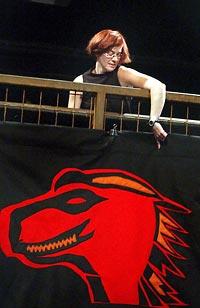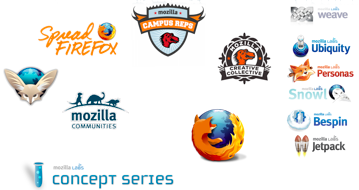I know, bold title.
Since I decided to start a blogging week, I see no reason not to start with a major topic I have been working on for a few months now. The future of local communities in Mozilla is made of two parts – Social and Technical.
I’ll start with the former, and it’s going to be a long one – you know me.
Notice: This is the way *I* see things. It is not representative of the l10n-drivers, the SUMO team, the QA team, or the marketing team.
But, it represents the progress of thinking about local communities we’re making right now. It is different from what you saw some time ago, and it may change in the future, it does not represent any kind of consensus, and my peers may disagree with me on some of my points.
A little bit of history
 Historically, and by that I mean years 2000-2004, when first strong local communities were constituted, it was centered all around localization. The localization ecosystem had several characteristics.
Historically, and by that I mean years 2000-2004, when first strong local communities were constituted, it was centered all around localization. The localization ecosystem had several characteristics.
- finite number of projects
- core of any local community were localizers
- each product had limited number of strings
- each product had a release cycle not shorter than 1 year
- we had limited awareness of localization importance among Mozillaians
Another specific thing about that time was that Mozilla as a community/project started growing faster than Mozilla as an organization. By this, I mean that people started participating in Mozilla all over the world, sometimes faster than the organization could predict, know about, understand and harness. It was very independent. What happened in Poland, was very different from what happened in Italy or U.S. or wherever. At the days when Mozilla was formally organizing, few people at the “central project” could predict what was happening across the world. At times, it was very frustrating to them…things were happening so fast, beyond the organization’s control.
As a motivated community, the Internet allowed us all to download the early Mozilla products, and gave us something to gather around. We did and it was amazing. People started fan sites, discussion forums, and “news-zines”, The most determined ones started seeking ways to bring Mozilla to their country. The most natural way to participate was to localize the product, and by localize I mean various actions that make the product more suited for the local market – translating, changing defaults and adding new features or modifying existing ones.
All this work was usually targeted in two directions – toward local markets, where those early community leaders were building local branches of Mozilla, and toward the Mozilla project to fit the concept of local communities, and the fundamental goal of internationalization of a project into the core of our project culture.
Thanks to that work in those days, today we can say that Mozilla is a global project and we recognize localizability as one of the aspects of Mozilla approach to projects.
But since those days, many things has changed. What was good by that time, may not be enough today.
Growth and Variety
 Fast-forward to today: Mozilla today as a meta-project is producing much richer set of projects/products/technologies than we ever did.
Fast-forward to today: Mozilla today as a meta-project is producing much richer set of projects/products/technologies than we ever did.
We create many websites of various sizes. We have blends of websites and extensions (like TestPilot). We have webtools like Bugzilla, addons.mozilla.org. We have products likeFirefox, Thunderbird, and Seamonkey. We have a mobile product with higher screen space limits. We have experiments that are introducing new level of complexity for localization like Ubiquity or Raindrop. We have more content than ever.
The point is this: local communities represent Mozilla through a diverse set of mature products, early prototypes, innovative experiements, one-time marketing initiatives, and documents like our Manifesto that will live forever. This means that the work flow has changed dramatically since the early days. Different projects with different or changing frequencis are becoming the standard for communities to absorb in a new differentiated and highly competitive marketplace. And, our communities need to evolve to respond to this.
Each product has different characteristics and the local delivery through l10n and marketing means a very different type of commitment. It now requires different amounts of time and energy, different types of motivation, and different resources.
Additionally, we’re also more diversified in the quest to fulfill our mission. We have regions where modern web browsers constitute vast majority of the market share, where governments, users and media understand the importance of browser choice or privacy and Internet is a place where innovation happens. But, we also have places where it is not the case. Where incumbent browsers are still the majority, where the web will not move forward in the same way it did in the past, where the latest technologies cannot be used, where privacy, and openness sounds artificial.
Recognizing this shift is important factor to allow us to adjust to the new reality where local communities have to expand beyond just localization. They must become local Mozilla representatives who are experienced in evangelism, marketing, localization, software development, and all other aspects of Mozilla. We need to get more local and grow beyond the responsibilities of our local communities in the past.
In the next part, I’ll cover some ideas for the future…
5 replies on “My vision of the future of Mozilla local communities (part 1)”
This is all great stuff… and a lot of it is the same thinking that led to me picking up the Mozillians.org community directory project. It is pretty much complete, but just needs a little push to get it live and in use by our many communities.
You should talk to Gerv, who is now managing that project to launch, and see how you can help him meet the needs you see for all the local communities that need our support.
Excellent stuff Gandalf – and truly agree. Looking forward to hearing your thoughts and talking to you about this further.
In that event I guess Mozilla should give each community control of the direction of their version of Firefox. It would be split into several local versions that tailor to that communities needs. Then I believe they would feel more of a connection to their respective versions of Firefox and thus promote them heartily over generic foreign browsers. Of course there would have to be a neutral base for Firefox that gives no preference to either community and all the API, frameworks, backends etc. would have to be more general purpose.
Great post Gandalf! Thanks a lot for writing it! I can’t wait to read the follow-up!
[…] two parts of my vision of local communities, I’d like to make a sudden shift to write a bit about […]